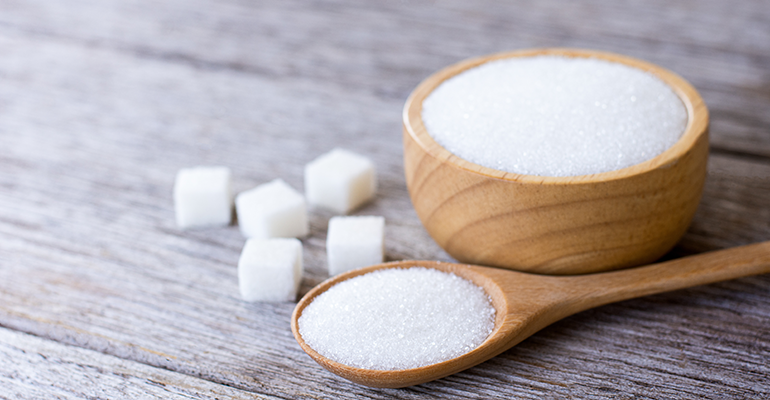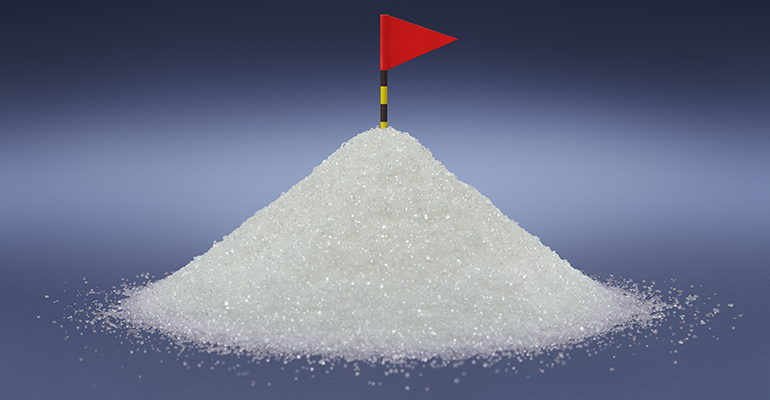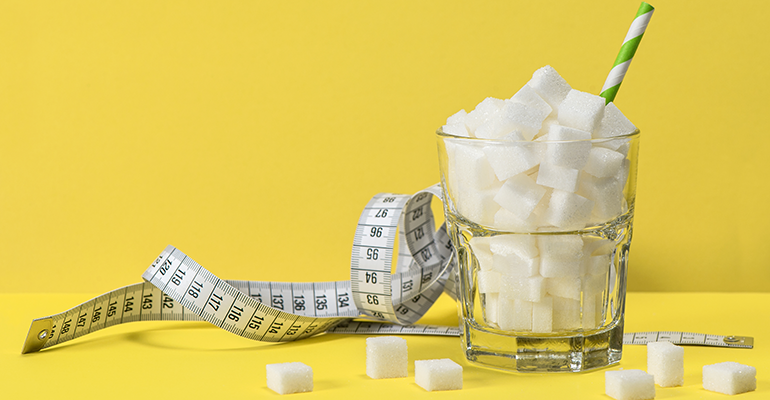News
Scientific review calls for added sugar intake to be halved
3 May 2023
A recent British Medical Journal (BMJ) review advises people to cut intake of added sugars to six teaspoons a day but industry group The Sugar Association has slammed the quality of data used in the review as “garbage”.
The review, which included 73 meta-analyses from 8,601 articles covering 83 health outcomes in adults and children, the reduction of added (“free”) sugars to around six teaspoons a day as well as limiting sugar-sweetened drinks to less than one serving a week.

According to current US dietary guidelines, no more than 200 calories should come from added sugars in a 2,000-calorie diet, which is about 12 teaspoons.
“This umbrella review shows that high dietary sugar consumption, especially intake of sugars that contain fructose, is harmfully associated with large numbers of health outcomes,” the researchers concluded.
“Evidence for the harmful associations between dietary sugar consumption and changes in body weight, ectopic fat accumulation, obesity in children, coronary heart disease, and depression seems to be more reliable than that for other outcomes.
“To change sugar consumption patterns, especially for children and adolescents, a combination of widespread public health education and policies worldwide is urgently needed.”
Sugar Association: ‘This is a red flag’
In a scathing response to the evidence review featured in the British Medical Journal (BMJ), the Sugar Association called into the question the methodology of the studies used as well as the timing of the publication.
“This is a review of existing evidence, and even a well-executed systematic review is only as good as the studies that are inputted. Essentially, garbage in equals garbage out,” said Courtney Gaine, president and CEO of the Sugar Association.
“Whenever conclusion statements are stronger than the actual findings and, even worse, don’t reflect the aim of the study or what the study was designed to find, it is a red flag.
 © AdobeStock/C. Fish Images
© AdobeStock/C. Fish Images
“Clearly there is something fishy here, but the timing of a paper like this in the midst of the 2025 to 2030 Dietary Guidelines for Americans process is not a surprise,” she added.
The review’s release comes as the US Dietary Guidelines Advisory Committee revisits the country’s Dietary Guidelines for 2025 to 2030 in which current guidelines recommend those two years and older keep an added sugar intake of less than 10% of their total daily calories.
For example, in a 2,000-calorie diet, no more than 200 calories should come from added sugars, which is about 12 teaspoons.
Reviewers highlight use of observational and low-quality studies
The BMJ researchers, from China’s Sichuan University and the UC Davis School of Medicine in Sacramento in the US acknowledged that existing evidence was mostly observational and of low quality – an observation picked up by the Sugar Association.
“It is known that added sugars literature suffers from significant variability when it comes to definitions, intake measurements and control of energy and other diet and lifestyle variables,” they wrote.
“The studies included in this review are primarily focused on sugar sweetened beverages, and not all sources of added sugars.
“It is clear the outcomes of studies do depend on source, which is why there is now recognition that food and beverage sources of added sugars should be viewed differently in scientific analyses.”
Sugar intake has dropped but obesity has rocketed, says Sugar Association
Generally, sugar-sweetened beverages are the largest source of added sugars, including carbonated and noncarbonated soft drinks, fruit drinks, and sports and energy drinks, the review cited.
 © AdobeStock/LiliGraphie
© AdobeStock/LiliGraphie
Previous surveys have shown that consumption of sugar sweetened beverages is declining in many developed countries, although consumption levels remain high.
“While popular amongst some to proclaim that reducing added sugars (to such levels as never before seen in over the 100 years of USDA’s record-keeping) will improve health, the real-world data suggest otherwise,” Gaines highlighted.
“We’ve seen sugar consumption drop 30% since 2000 while obesity rates in adults have tripled and in children, quadrupled.”
Related news

Oat Barista: Innovation for game-changing beverages
20 Nov 2025
Oat Barista is a clean label, sustainable, and innovative drink base specifically designed to create the perfect foam in one single ingredient.
Read more
How younger consumers are redefining ingredient choices and rejecting brand loyalty
18 Nov 2025
Gen Z and millennial consumers’ preferences for transparency, functionality, and purpose are “redefining the very nature of consumption itself”, says SPINS.
Read more
Hybrid formats and flexible positioning to disrupt category norms in 2026
17 Nov 2025
Trend forecasters expect food and drink to move more fluidly across occasions, functions, and formats as consumers seek versatility, novelty, and convenience.
Read more
Danone highlights digestive health as potential ‘tipping point’ for food industry
13 Nov 2025
Danone is betting on a food industry “tipping point” that will bloat the market for healthy products, particularly those related to gut health.
Read more
New UPF standard hoped to offer consumers ‘coherence and clarity’
10 Nov 2025
Ingredients companies are being urged to enter “a new era of partnership and innovation” following the launch of the industry’s first non-UPF verification scheme.
Read more
Faravelli at Fi Europe: Showcasing FARA® functional solutions for food and nutra
28 Oct 2025
At Fi Europe 2025 in Paris (stand 72M39), Faravelli showcases FARA® Customized Functional Solutions and a wide ingredient portfolio for food and nutra – delivering quality, innovation, and expertise.
Read more
Agrigum Redefined FIBER
27 Oct 2025
Agrigum has transformed gum acacia into a natural, science-backed fibre that supports gut health, sustainability, and innovation across global food and nutrition applications.
Read more
Expanding boundaries in food & beverage innovation
23 Oct 2025
IMCD and FrieslandCampina Professional expand partnership to deliver Kievit® across EMEA, enabling brands to enhance quality and accelerate time-to-market for tomorrow’s food & beverage creations.
Read more
Amazon Grocery launch aims to balance quality with affordability
22 Oct 2025
Global e-commerce giant Amazon has introduced a new private-label food brand, combining existing Amazon Fresh and Happy Belly products with new everyday items.
Read more
Powerade enters hydration space with launch of Power Water
21 Oct 2025
Coca-Cola’s Powerade brand has launched a zero-sugar, electrolyte-enhanced functional water, marking the brand's entry into the hydration space.
Read more